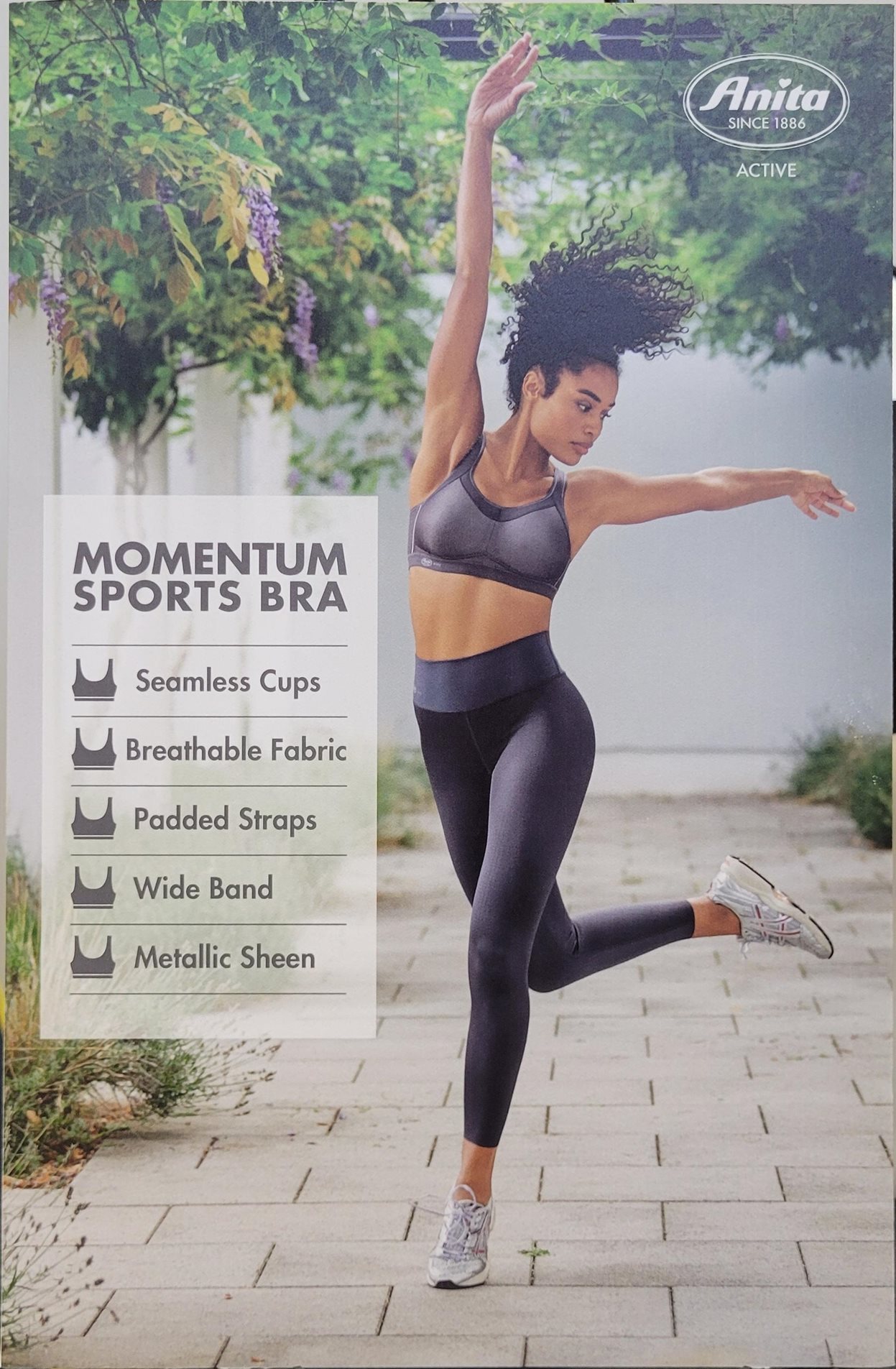September 2024
.jpg)
Bras: The Continuing Research Saga
By Andrea Porter
Did you know that sports bras lose their support after 25 washes? So that favorite, five-year-old sports bra– yeah, it’s useless. It’s been useless for a long time. Thank it for its service; place it delicately in the trash and start shopping! Realistically, I’m not one to toss mine after 25 washes either – these bras are expensive! – but like year-old running shoes, it has more than served its time. Let it go!
The hunt for a new sports bra may require some insider knowledge because not all sports bras are equal. If you found my earlier article on finding the right bra helpful, this will add to your knowledge and help you find the right support for your athletic endeavors.
Research says 75-85% of women wear the wrong bra size [1]. It’s likely an even greater number wear both the wrong size and the wrong type of sports bra. Poorly supported and inaccurately fitted sport bras correlate with musculoskeletal pain, especially breast and upper back pain [1, 2] . Moreover, bouncing breast tissue damages the fine, hair-like suspensory ligaments that provide the breast shape and lift. No amount of weightlifting can reverse damage or help shape and lift the breasts because breasts contain no muscle for support. The sports bra is the support; it’s important to make sure it’s a good one!
BRAS BRAS BRAS
There are three types of sports bras to consider, in order of least to most supportive.
1. Compression
A compression bra is likely the first image that comes to mind when you think sports. It flattens the breast tissue to the chest and creates the colloquial “uniboob.”
2. Encapsulation
Encapsulation bras look like regular underwire or wireless bras but are made with sturdier materials that control movement within each cup. The design philosophy is that two smaller masses are easier to control than one large mass [3] . Encapsulation bras come in underwire or wireless types.
3. Hybrid
The hybrid sports bra combines encapsulation and compression for maximum support. These also come in underwire or wireless.
EXERCISE COUNTDOWN
To understand which type is the best one for you, begin with the type of activity you have in mind. If you’re a C cup doing yoga, go for a compression bra. For modest to high intensity activity like running or bicycling, try an encapsulation type. For aerobic or very high-intensity exercises look for a hybrid. Also if you have had chest and back pain while exercising in the past, use a more supportive bra type than what you have worn in the past. For cup size D and larger, a hybrid sports bra will be your new best friend regardless of your exercise routine. If you are an A or B cup, the world is your oyster because all the cute styles come in your size; compression works for any activity.
SIZE IS NOT ALWAYS THE SIZE
Sizing in sports bras can be quite tricky. Bra sizes are not standardized, so don’t expect to find the same sports bra size as your everyday bra size. One manufacturer’s 34D compression bra can be the next one’s 36C (band measurements do not always equate to size.) If it’s possible, have someone else measure your bra band circumference and your breast apex circumference, which may or may not be at the nipples. Then go to the manufacturer’s website, put in your measurements, and use their size chart as a place to begin. The professional bra fit criteria in my last bra article will help you find the right fit. Looking online will also give you numerous options. As you peruse the web, note these specific features to consider.
Cups:
Cups that rise higher on the chest and sides encase the whole breast to control movement. A stiffer fabric, especially at the top of the cup, controls the breast’s upward, bouncing movement during moderate to intense activity. Side slings, a supportive fabric feature around the outside of the cup, control side-to-side movement.
Band:
The band provides most of the support; if the band moves on your body, the breasts move with it. Go for a wider, sturdier band with multiple hooks that supports the weight of your breasts and fits snuggly (but not uncomfortably). Although it's cumbersome, stay with hooks in the back; front closures only weaken the breast support. When you try on the bra make sure it fits on the last hook. Then as the elastic degrades, you can move up in hooks to maintain the band tautness and keep your bra longer.
Straps:
The trick to controlling the breasts from rising while running or jumping is keeping the straps on the shoulders. If the straps lose contact with the body, they lose control of the breast. It’s best to get a bra that has adjustable shoulder straps to customize the fit. Racer backs distribute weight and tension across the back, but no matter the strap type, wider, padded straps distribute weight and add comfort. The transition from the cup to the strap should be inelastic and graduate from large to small as it moves up the body. The transition area also helps restrict the breast’s upward movement in intense activity [4] .
Gore:
The gore, the middle part of the bra between the breasts, is second only to the band in providing support. (Compression bras do not have a gore.) The gore should lie flat against your chest wall to help encase each breast separately in the cup. If the gore does not lie flat against your chest, the cups are too small, and the support will be inadequate.
Fabric:
The less elastic the better – avoid lace or stretchy materials like those found in fashion bras. Obviously, you need a little stretch, but only a little. Breathable, wicking fabrics are also important because women’s sweat production on the torso is concentrated in the areas the bra covers. Also bras without padding wick moisture better.
Underwire or wireless
This is a comfort decision, though underwire provides better shape for a better aesthetic.
Price
Sadly, finding the right bra and affording it are two different things. Be ready to pay $60-100 for a good sports bra. Discount store bras do not provide the support of higher quality brands. Even well-known athletic brands have grades of bra quality, so the well-known logo may not necessarily mean higher quality support.
Washing tips
Wash your new sports bra in cold water on delicate and DO NOT put it in the dryer. Heat quickly degrades elastic, so treat your new bra like you would an expensive dress. Use careful laundering to protect your investment and make it last as long as possible. Expect a great year with your sports bra, but remember when the year is over, it’s time to break up.
Good luck in your quest for your new, well fitted sports bra! Remember that many stores put bras on sale as much as 50% off on Black Friday, so start perusing now to get your buying list ready!
An Easter egg if you read to the end of this article: Three women developed the first sports bra in 1977 [5] . The prototype was made of two jock straps; incidentally, the jock strap was invented more than 100 years earlier in 1874 [6].
[1] J. R. Steele, C. E. Coltman, and D. E. McGhee, "Effects of obesity on breast size, thoracic spine structure and function, upper torso musculoskeletal pain and physical activity in women"; J. of Sport and Health Sci., vol. 9, no. 2, pp. 140-148, 2020, doi: 10.1016/j.jshs.2019.05.003.
[2] M. A. Abtew, P. Bruniaux, F. Boussu, C. Loghin, I. Cristian, and Y. Chen, "Development of comfortable and well-fitted bra pattern for customized female soft body armor through 3D design process of adaptive bust on virtual mannequin"; Comput. in Industry, vol. 100, pp. 7-20, 2018, doi: 10.1016/j.compind.2018.04.004.
[3] Choosing a Sports Bra. (February 2004). Aurora, CO. [Online]. Available: https://www.ucdenver.edu/docs/librariesprovider65/clinical-services/sports-medicine/choosing-a-sports-bra.pdf?sfvrsn=5a325bb9_2
[4] J. Pei, L. Griffin, S. P. Ashdown, and J. Fan, "The detection of the upper boundary of breasts using 4D scanning technology"; International Journal of Fashion Design, Technology & Education, Article vol. 14, no. 1, pp. 1-11, 2021, doi: 10.1080/17543266.2020.1829097.
[5] National Museum of American History. "JogBra production model"; https://americanhistory.si.edu/collections/nmah_1461431 (accessed Aug 20, 2024).
[6] L. Italie. "The jockstrap is now 150 years old and it was invented in Boston" https://www.cbsnews.com/boston/news/jockstrap-150-years-old-invented-in-boston-massachusetts-bike/ (accessed Aug. 20, 2024).
